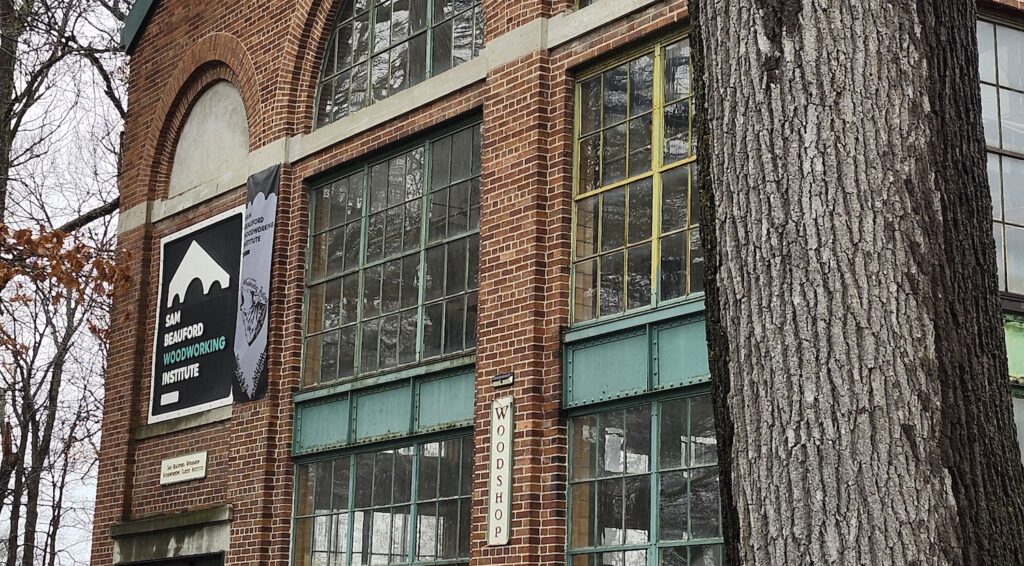
ADRIAN — Big plans for the Sam Beauford Woodworking Institute were detailed at the Oct. 21 Adrian City Commission meeting, along with a request for the city of Adrian to consider selling 22 acres of city-owned land on the north side of town for a future campus.
Luke Barnett, founder and president of the woodworking institute, asked the city commission to consider selling 22 acres of the property known as the Witt Farm, which is located east of M-52 on the north side of Adrian. He began by giving commissioners an introduction to the woodworking institute and its programs.
“We are a college that trains people for careers in the forest products industry,” he said, adding that students come from all over to attend woodworking classes there.
The woodworking institute is currently at 1375 N. Main St., on the campus of PlaneWave Instruments. It has both a one-year diploma program, which enrolls 24 students per year, and a variety of classes that are open to the general public. In August, Barnett said, the institute was notified that it had been approved for Title IV accreditation, which will allow it to participate in federal financial aid programs.
The diploma program has a long waiting list, Barnett said, and its graduates are highly sought-after by employers. But the institute doesn’t currently have room to expand. Another thing that’s missing, he said, is the ability to offer a traditional residential college experience.
Buying part of the Witt Farm property would allow the institute to change that, Barnett said.
The 22-acre parcel the institute would like to purchase consists of 18 wooded acres and 4 acres of farmland. The Sam Beauford Woodworking Institute is asking the city to consider selling the 18 wooded acres for $1, and the remaining 4 acres at whatever price the commission determines is fair.
In a letter presented to commissioners at the meeting, Barnett said the wooded portion of the land presents significant challenges for development. “However,” he wrote, “these very characteristics make it an ideal setting for the college campus we envision — a place where education, nature, and craftsmanship converge. The forested area provides a unique opportunity to create a campus that complements both the natural environment and our educational mission.”
City administrator Greg Elliott said that when the city has tried to market the property, it has mainly focused on the farmland and has not been trying to sell the wooded sections. About five years ago, he said, a developer interested in building senior living was willing to pay $8,000 per acre, but that plan fell through. In the past, the city has received offers as high as $20,000 per acre, but that possibility might not arise again.
The Witt Farm was purchased by the city in 2000 with the goal of using it for future development. Although numerous developers have expressed interest over the last 25 years, nearly all of the projects have fallen through. Elliott said the only successful sale has been to the Gaslight Village assisted living facility, which opened in 2015.
Barnett said the woodworking institute would like to have a new campus ready to move into in four years. Its goal is to grow to 50 graduates per year in five years and 200 graduates per year in 20 years.
Phase 1 of the campus development is projected to cost $12 million, he said, and currently the institute has $4.1 million in pledges. The long-term plan is projected to cost $40 million.
The institute is also looking at land in Tecumseh, Barnett said, but proximity to the Lenawee Intermediate School District, Siena Heights University, and Adrian College make Adrian a more attractive prospect.
Commissioner Bob Behnke said the proposal seems like a good opportunity for Adrian, particularly with Jackson College reducing its physical presence in town, and that he’d much rather have woodworking students come to Adrian for classes than see them going to Tecumseh instead.
Commissioner Mary Roberts was both supportive and cautious. She noted that the Witt Farm property is part of the Adrian-Tecumseh Local Development Finance Authority, which is intended in part to generate property taxes, while the woodworking institute is a tax-exempt nonprofit. She also said that the city has supported the woodworking institute’s plans in the past, with good results, but that there might be other businesses and organizations looking for the city’s support as well.
At the same time, she said, “I think that we need to be cautious with taxpayer land, taxpayer dollars, but we also need to take chances.”
Elliott said there is no legal restriction on the land being sold to a nonprofit.
“The goal of that property is to throw off positive economic impact, and there are different ways you can look at that,” he added. For example, he said, the University of Michigan doesn’t pay property taxes in Ann Arbor, but the economic impact of its presence far outweighs the loss of tax revenue.
The discussion at the Oct. 21 meeting was informational only, and no action was taken.
Previous stories:

